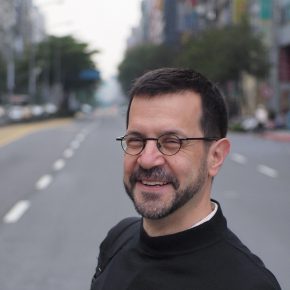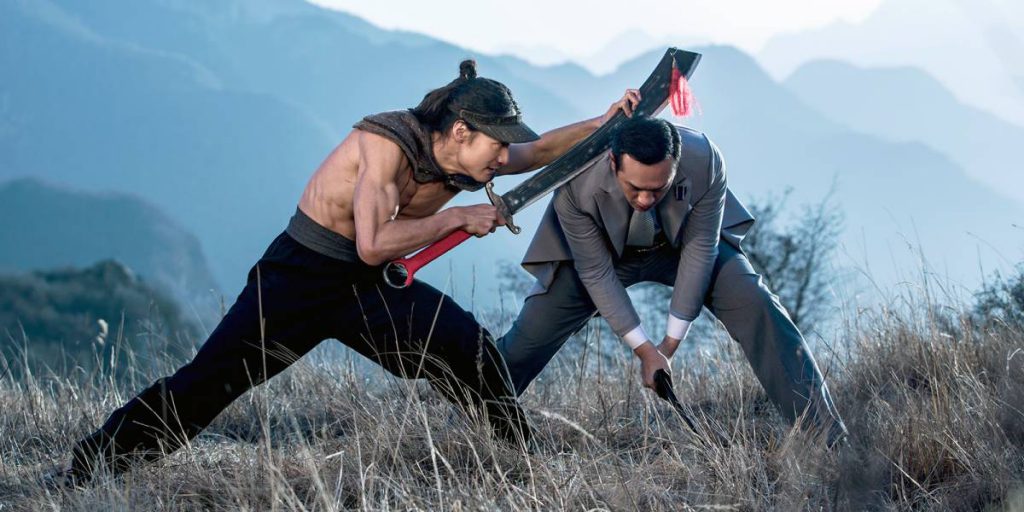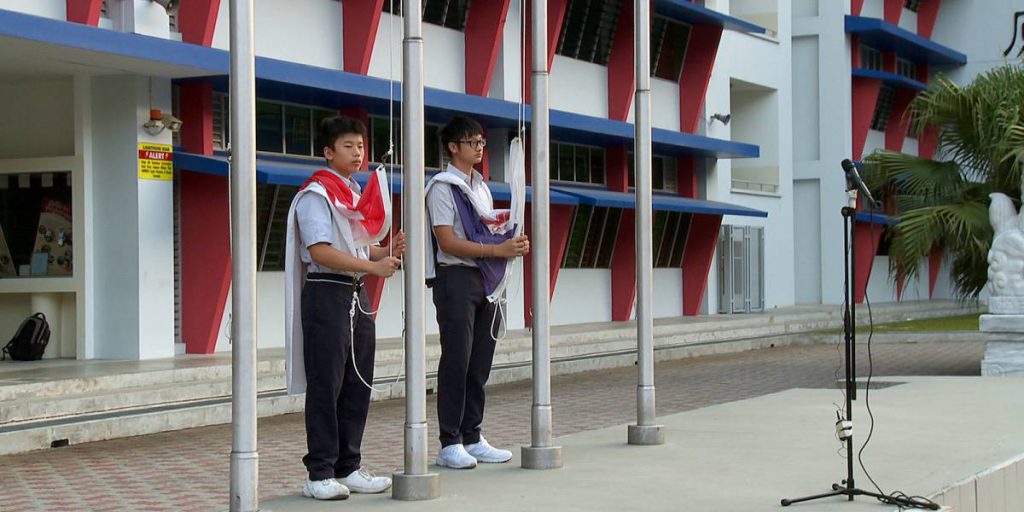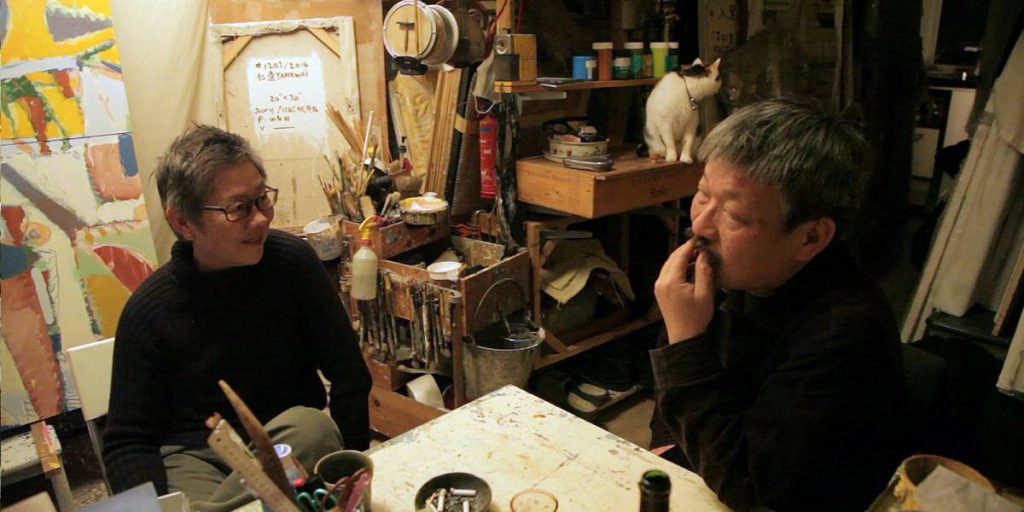
Shelly Kraicer, programmer of Dragons & Tigers at VIFF
A long-time Beijing resident (only recently relocated to Toronto by way of Taiwan) for the past decade, Shelly Kraicer has been the programmer of East Asian films for the Vancouver International Film Festival. More recently, he has consulted for the Venice, Udine, Dubai, and Rotterdam International Film Festivals, organizing a retrospective on legendary Hong Kong director Johnnie To for this year’s Toronto International Film Festival’s fall programming.
Known for his encyclopedic knowledge of Chinese cinema, Kraicer has been a tireless promoter of big and small names alike. His selections for VIFF over the years have ranged from shoestring documentaries to big budget costume dramas.
Chances are, if you’ve enjoyed an East Asian film at VIFF in the last ten years, Kraicer was behind the scenes, pulling the strings to make it happen. The result has been a phenomenal amount of high quality Chinese language cinema, much of it almost impossible to see otherwise. To find out more about the method behind the madness, I sat down with Shelly to talk about some of his picks for this year’s festival, which runs from September 28 to October 13.
❇︎
Nick Stember: Looking at the roster of Chinese films for this year’s VIFF, I have to say I’m really impressed with your line up. Are there any films in particular that you think really speak to the goals you’ve set up for yourself as a curator?
Shelly Kraicer: All of them I should say! I mean, it’s like asking which of your children is your favorite! But I think if I’m doing my job correctly, I’m selecting a representative range of the creativity I am excited to discover infusing Chinese language filmmaking. So that can be all the way from the super independent, low-budget challenging end, which would be Yangtze Landscape, which is a one man show, all the way to The Hidden Sword, which is prestige genre filmmaking. But from Xu Haofang, who’s made a series of art film, wuxia films. Have you seen any of his films?
NS: I haven’t I’m afraid.
SK: This is the fourth. He started as an art wuxia filmmaker, sort of like King Hu, but on a smaller scale, all about philosophy and stillness, and definitely not broad-based. And he’s gradually been changing the actors he uses to more famous ones. This one is all stars and he’s been changing, or tweaking his film language to be more accessible. So now he’s finally made a big budget wuxia comedy, adventure, period, action, swordplay film. So for me it’s fascinating. So that reaches larger audiences, we obviously want to connect to local audiences here and not just serve as fans of slow cinema or tough indie art films. But I think The Hidden Sword is one of the few commercial films this year, other than the Feng Xiaogang film, that’s very, very artful in China, and really fascinating to people who love film.

The Hidden Sword, directed by Xu Haofang (China, 2017)
And then there are middle films, like Foolish Bird, which are independent narrative films. Not so experimental, but films want to engage with audiences, without challenging them formally. But a smaller kind of audience, rather than the masses.
NS: You’re trying to get a full range of what’s out there.
SK: That’s exactly what I’m trying to do. Dragonfly Eyes is obviously closer to gallery work, since it was filmed (or put together) by an artist. But it’s in narrative cinema form. So that’s more traditional film festival fare. I should say as well as trying to balance and find a representative range of films, I keep in mind Vancouver’s tradition, the fact that Tony Rayns [the founder of the program] set up the Dragons and Tigers section to provide a space for challenging cinema. For independent cinema by young directors to be able to have films that meet audiences, we need to preserve that space here. So we take special care that we have more challenging work from young directors. I think that’s part of our mission.
NS: As opposed to the old masters, you have younger directors as well.
SK: Right. There are other festivals, whose names I shouldn’t mention, who like to program festival films. So films they already know. Maybe they’ve just come from Cannes or Venice or Berlin and they’re plugged into the system and they’re commodities. They’re art film commodities. So they are what comfortable, elite festival consuming audiences want to see. But that eliminates the tough, edgy, experimental, more challenging end. Which I absolutely try to carve out and preserve a space for.
NS: As much as people are getting more directly engaged with Asian cinema, it doesn’t seem that’s been mirrored as much on the festival side of things. I feel like a lot of festivals still more targeted towards their base, the older audience that maybe wants to see more European films, or Oscar-type cinema.
SK: Right, that’s exactly what I was trying to say, too. So I try to keep that core of the VIFF Dragons & Tigers mandate going. In Time to Come is really beautiful, and one that would fit into that category. And obviously Dragonfly Eyes, Yangzte Landscape, and a number of the short films. One way to support younger directors and try to identify who might be making exciting longer films in the future is to make sure I have space for some short films.
We don’t have a short film section in Dragons & Tigers anymore, unfortunately, so I try to pick things that I can put with a feature, where the length works and I hopes there’s some sort of reasonable connection between the two.

In Time to Come, directed by Tan Pin Pin (Singapore, 2017).
NS: I thought it was interesting, too, that you have In Time to Come, and then you also have Fish Out of Water, and both kind of have this commentary on place. So in Fish out of Water, the mother is a real estate agent, and they are struggling to make ends meet, and the son is having these psychological problems. And those problems are sort of a reflection of their situation. And in In Time to Come, you have this snapshot of, “What are we going to save from Singapore?” as they go about putting together this time capsule. And I wonder if that’s something you think that audiences here in Vancouver might respond to. Because Vancouver, the number one thing people talk about here is real estate, especially when we talk about China, the supposed or alleged impact of Chinese money on the real estate market here. It’s a very diffuse question, I know.
SK: No, I mean, I have a very diffuse answer. One of the things, and I can maybe work this out more clearly when I write about it later, but one of the most deep, experimental impulses in a lot of these movies that attracts me is their attempts to grapple with space, and how concepts of space are changing. How Hong Kong space is very different from Taiwanese space, which is different from certain kinds of mainland film space, and Singapore. If you’re a filmmaker, people talk a lot about manipulation of time and film constructed time, like in Tsai Ming-liang’s work.
But space is the other dimension that you have at a deep, fundamental level to creatively grapple with and try to reflect in your images. The way these image makers grapple with image-making space is one of the most interesting undercurrents about most cinema today, and it’s certainly a major concern in East Asia. Because of the way people are moving into cities, The capitalization of space, people’s access to space. And in Hong Kong, the loss of local space, and in Taiwan, the restricted and perilous status of their autonomous space are all huge issues. Issues pressing on people’s unconscious or conscious. So that pressure of space conscious, how we live in it, how is it changing, how can we survive, obviously I think, comes out in creative art and cinema art because that’s what’s pressing on people.
That was vague!
NS: No, no, that was a good answer!
SK: I’m still trying to work that out. But it’s interesting you pointed that out, I never thought about that. In almost all of these movies there is this idea of space.
NS: Right, I was thinking about that because I just watched Christopher Doyle’s Hong Kong Trilogy, I don’t think it got a huge release, but it’s coming out on the Sundance Channel this month, on their online platform. That film is all about the space of Hong Kong. It’s very different from some of his other films, because there’s a lot of static shots of Hong Kong buildings, and then people in these spaces.
SK: My other major project now is I’ve just organized a Johnnie To retrospective for TIFF in Toronto, and his movies are completely about space. He’s a master of spatial filmmaking, specifically the Hong Kong kind.
NS: One the most anticipated films to be screened at last year’s VIFF was the collection of short films from Hong Kong, Ten Years. How would you compare this film to the Angie Chen documentary I’ve Got the Blues screening this year?
SK: They’re really different topics and genres, I think. Ten Years is very much politically motivated, because it has this urgent political issue. And all of the sections are fiction. So the motivation and the form is different. Whereas I’ve Got the Blues is a personal documentary, of one friend of another friend—Angie Chen on Yank Wong. It does have political dimensions, because she gets into Yank Wong’s thoughts about 1989 and Hong Kong’s changing status and evolution today. It’s an unavoidable topic. But that’s not the primary motivation behind it. It’s more an exploration of how you can understand the mind of a creative guy. And it’s about Angie Chen and Yank Wong’s complicated relationship, too. So the form is a personal and semi-experimental documentary, because it’s also about its own making, at the same time. I think it would be hard to make connections between the two films.

I’ve Got the Blues, directed by Angie Chen (Hong Kong, 2017)
NS: So more of a meta-documentary?
SK: Yeah! They have fights! He says, “This isn’t working, what are you trying to do?” and she says, “I’m just trying to make my movie. And then he says, “Why don’t you just stop?” But they work through it on camera for us. But they actually work through it, and get to a different place. Three times, the film almost breaks down. And then she’s tough and relentless and keeps the camera on. He’s complicated and creative and there’s some core, that they’re both dedicated to this project. So they work these things out. I’ve never seen a film do that.
NS: It almost sounds like reality-tv—
SK: Or just a super honest documentary. Most documentaries elide the difficult stuff. There are all these Chinese documentaries where you’re following some individual, usually it’s an underclass, a 底层 [lower class] documentary. And obviously you’ve got permission from your subject, who’s maybe is a fortune teller in some tiny, poor town. We’re following him into other people’s homes, but we never see the negotiation about how people are asking them, “Can we go into you home? What can we shoot?” All of that stuff is gone. But the documentary still projects an aura of authenticity and truth. Only the mechanism is take away everything about how you’ve set it up.
NS: So you’ve removed the filmmaker.
SK: Right, in order to give it a ‘reality effect,’ as some people call it. But in Angie Chen’s I’ve Got the Blues it’s all there. So I was sort of relieved and thrilled that it’s a documentary that’s actually really committed to capturing its subject and its filmmaking.
NS: In your tenure at VIFF, you’ve made a point of promoting documentaries in particular. I know that in previous interviews you’ve discussed that as being something of a coincidence—documentary film has at least historically been a more active, and more open form of filmmaking in mainland China, which has led to more unique films. Do you think this is still the case today?
SK: I think it’s hard to say. I think a lot of the most creative independent filmmakers who are still doing independent films are documentary filmmakers. So I guess that’s more open. Or at least I wouldn’t say open, it’s slightly less policed, perhaps. But I know documentary filmmakers who get into trouble and are super careful.
So I wouldn’t say that, no. I guess from the smaller group of filmmakers who are dedicated to filming whatever they want, and not worrying about hoping to get the thing released in China, most of them now seem to be working in documentary, rather than fiction. It seems to be almost everybody I know working in feature fiction is working on figuring out how to get their new works shaped so that they’ll pass. Almost everybody in fiction, indie filmmakers. Formerly indie filmmakers? But the documentary filmmakers I know and keep an eye on don’t seem to have made this mental shift.
NS: They’re not as obsessed with how to get passed.
SK: I mean, partly because the market for documentaries in China, you can do nice ones about birds, and the environment. But it’s not like they are trying to get into this market that exists. And I think they are also motivated by issues. A lot of Chinese documentaries are about problems. It’s like journalism in China is an activist profession. Or at least it is for radical journalists.
NS: I think under Trump they are starting to here—
SK: Yeah, that’s true! But I guess documentary film makers, a lot of them have a journalist impulse. Which is an activist impulse. They want to do a kind of politics of change, but in cinema form. I mean, the ones who really interest me find new formal ways in film language to express what they want to say about some aspect of Chinese reality. So it’s not just that the political ones are interesting or creative. I actually like it when they are trying to what you can do new formal language, to say things you can’t say in regular film. Like Dragonfly Eyes, which is not a documentary, but it is absolutely constructed with documentary materials.
The Vancouver International Film Festival runs from September 28-October 13, 2017. Click here for Part II of our interview with Shelly Kraicer.